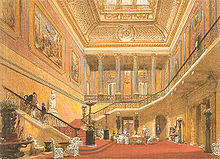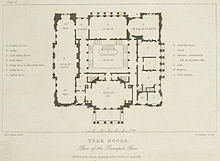| Lancaster House | |
|---|---|
 | |
| General information | |
| Architectural style | Neo-classical |
| Location | St James's London, SW1 United Kingdom |
| Coordinates | 51°30′14″N 0°8′21″W / 51.50389°N 0.13917°W / 51.50389; -0.13917 |
| Current tenants | Foreign, Commonwealth and Development Office |
| Construction started | 1825 |
| Completed | 1840; 184 years ago (1840) |
| Owner | HM Government |
| Technical details | |
| Floor count | Three (plus basement) |
| Design and construction | |
| Architect(s) | Benjamin Dean Wyatt (interior and exterior) Sir Charles Barry (interior) Sir Robert Smirke (interior) |
| References | |
| Listed Building – Grade I | |
| Official name | Lancaster House |
| Designated | 5 February 1970 |
| Reference no. | 1236546 |


Lancaster House (originally known as York House and then Stafford House) is a mansion on The Mall in the St James's district in the West End of London. Adjacent to The Green Park, it is next to Clarence House and St James's Palace, as much of the site was once part of the palace grounds. Initially planned for Prince Frederick, Duke of York and Albany, it was ultimately completed by the Duke of Sutherland, then Marquess of Stafford, as an aristocratic townhouse in the early 19th century, and known for its lavish interiors. Gifted to the government in the early 20th century, it houses the government's wine cellars and was home to the London Museum until World War II. Now used for diplomatic receptions and related functions by the Foreign Office, it is a historic Grade I listed building, and its interiors are sometimes used in films or television as a stand in for Buckingham Palace.
History
Construction of the house commenced in 1825 for the Duke of York and Albany, the second son of King George III, and it was initially known as York House. Sir Robert Smirke was originally hired to design the house, until under the influence of the Duke's mistress the Duchess of Rutland, he was replaced by Benjamin Dean Wyatt who mainly designed the exterior. The house was only a shell by the time of the death of the Duke in 1827. It is constructed from Bath stone, in a neo-classical style. The lease of the house was purchased by the 2nd Marquess of Stafford (later 1st Duke of Sutherland) and was under his direction that it was completed in 1838. It was known as Stafford House for almost a century.
The completed building was three floors in height, the State rooms being on the first floor or piano nobile, family living rooms on the ground floor and family bedrooms on the second floor. There was also a basement containing service rooms and wine cellar. The interior, featured an imperial staircase which was designed by Sir Charles Barry, as well Louis XIV Style rooms which were lavishly decorated.
The Sutherlands’ liberal politics and love of the arts attracted many distinguished guests, including factory reformer the Earl of Shaftesbury, anti-slavery author Harriet Beecher Stowe and Italian revolutionary leader Giuseppe Garibaldi. Chopin gave a recital there in 1848 in the presence of Queen Victoria.
Queen Victoria is said to have remarked to the 2nd Duchess of Sutherland on arriving at Stafford House, "I have come from my House to your Palace." With its ornate decoration and the dramatic sweep of the great staircase, the Grand Hall is a magnificent introduction to one of the finest town houses in London. In 1877 the House became the eponymous home of the Stafford House Committee for the Relief of Sick and Wounded Turkish Soldiers, formed by the 3rd Duke to aid Ottoman refugees and wounded during the Russo-Turkish War.
The house went out of royal favour after the 3rd Duchess died, in 1888 and her husband married his mistress within months. In 1912 the lease was purchased by the Lancastrian industrialist and philanthropist Sir William Lever, 1st Baronet (later 1st Viscount Leverhulme) who renamed it in honour of his native county of Lancashire and presented it to the nation in the following year.
Since 1922 the building has housed the Government Wine Cellar, and, from 1924 until shortly after the Second World War, the house was the home of the London Museum.
The allied government's European Advisory Commission on the political and social future of Europe after the Second World War met here throughout 1944 and into 1945. In January 1947 a special envoy meeting on affairs concerning occupied Austria was hosted here. The year 1956, the house saw the signing of the agreement of independence for Malaya. In 1961, South Africa affirmed its intention to become a republic, inside the Commonwealth. In 1979 it was the scene of the Lancaster House Agreement, which led to the independence of Rhodesia, now Zimbabwe, from the United Kingdom.
The house was the venue for the 10th G7 summit in 1984 and the 17th G7 summit in 1991. A new 35-foot-long table was built for the Long Gallery, where the main negotiating sessions were planned in 1991.
Prime Minister Theresa May gave a speech at Lancaster House in January 2017 outlining Britain's intended future relationship with the European Union following the 2016 United Kingdom European Union membership referendum which resulted in a vote to leave. The speech is commonly referred to in the media, and in political discourse, as the "Lancaster House speech".
In popular culture
Winston Churchill commented that towards the end of the 19th century, "glittering parties at Lansdowne House, Devonshire House or Stafford House (Lancaster House) comprised all the elements which made a gay and splendid social circle in close relation to the business of Parliament, the hierarchies of the Army and Navy, and the policy of the State".
Lancaster House has been extensively used as a filming location. It has stood in for Buckingham Palace at least six times in film and television: for the comedy film King Ralph (1991), the mystery adventure film National Treasure: Book of Secrets (2007), the historical drama film The Young Victoria (2009), the historical drama film The King's Speech (2010), and the 2013 Christmas special for Downton Abbey, when Rose is presented to the King and Queen during the London Season. Lancaster House reprised its role as Buckingham Palace for the Netflix series The Crown. The interior was used to represent the Winter Palace in St. Petersburg for the 1981 film Reds. It also appears as the house of Lady Bracknell in the comedy of manners film The Importance of Being Earnest (2002), and as the site of a masquerade ball in the Merchant-Ivory film The Golden Bowl (2000).
See also
- The Lancaster House Conferences
- The Lancaster House Treaties
- The Lancaster House Agreement
- The Government Wine Cellar
References
- ^ Historic England. "Lancaster House (Grade I) (1236546)". National Heritage List for England. Retrieved 18 June 2015.
- ^ Stourton, James (16 October 2012). Great Houses of London. London: Francis Lincoln. ISBN 978-0711233669.
- Walford, Edward. "St James's Palace Pages 100-122 Old and New London: Volume 4. Originally published by Cassell, Petter & Galpin, London, 1878". British History Online. Retrieved 13 July 2020.
- Chopin in Britain PhD Thesis Durham University by Peter Willis pp138-147. He played some Mazurkas and a Mozart Duet
- "Stafford House Committee for the Relief of Sick and Wounded Turkish Soldiers". National Archives. Retrieved 5 November 2024.
- DĐNÇYÜREK, SADĐYE SENA. "A "compassionate" Episode in Anglo-Ottoman History: British Relief to '93 Refugees (1877–78)" (PDF). Bilkent University. Retrieved 5 November 2024.
- Caitlin Davies (8 March 2018). Bad Girls: A History of Rebels and Renegades. Hodder & Stoughton. ISBN 978-1-4736-4775-6.
- "From the archive: Inside the UK Government's Cellar". Decanter. 16 July 2021. Retrieved 25 April 2023.>
- Goldsmith, Belinda (1 March 2013). "Britain's government sells French wine to pay its drinks bill". Reuters. Retrieved 1 March 2013.
- "Historic Houses: Lancaster House, St James's. 'London Museum Stafford House'". National Archives. Retrieved 25 April 2023.
- Japan, Ministry of Foreign Affairs (MOFA): Summit Meetings in the Past.
- Apple Jr., R.W. (15 July 1991). "Reporter's Notebook; British Hosts, Being British, Plan an Understated Splendor". The New York Times. Retrieved 29 April 2011.
- "Read Theresa May's Speech Laying Out the U.K's Plan for Brexit". Time Magazine. 17 January 2017. Retrieved 25 April 2023.
- Churchill, Winston (1930). My Early Life. Eland. pp. 8@. ISBN 9780907871620.
- "Where was King Ralph filmed?". British Film Locations. Retrieved 31 October 2017.
- "Uncovering The Mystery Of The Book Of Secrets: Behind The Scenes At Buckingham Palace". Historic Cornwall. 18 January 2023. Retrieved 25 April 2023.
- "Period Drama Film Location: Lancaster House". Lady and The Rose. 17 November 2019. Retrieved 25 April 2023.
- "The King's Speech Filming Locations in England". Almost Ginger. 5 November 2021. Retrieved 25 April 2023.
- "Filming Location Matching "Lancaster House, The Mall, St. James's, London, England, UK" (Sorted by Popularity Ascending)". IMDb.
- "The Crown filming locations you can visit in real life". House and Garden. 7 November 2022. Retrieved 25 April 2023.
- "The Importance of Being Earnest (2002) - IMDb" – via www.imdb.com.
- "The Golden Bowl (2000) - IMDb" – via www.imdb.com.
Bibliography
- Yorke, James (2001). Lancaster House: London's Greatest Town House. Merrell Publishers Ltd. ISBN 9780385601153.
External links
| British royal residences | |
|---|---|
| Official | |
| Private | |
| See also | |
- Houses in the City of Westminster
- St James's
- Houses completed in 1840
- National government buildings in London
- Grade I listed buildings in the City of Westminster
- Grade I listed government buildings
- Grade I listed houses in London
- Leveson-Gower family
- Georgian architecture in the City of Westminster
- Neoclassical architecture in London
- Charles Barry buildings
- Townhouses in the United Kingdom